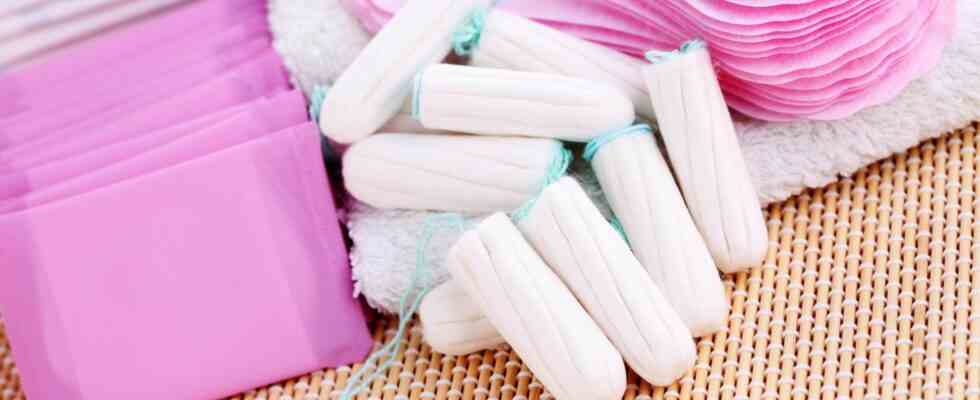In Scotland women have access to free period products from today. An important step that many countries should follow. Especially since free pads and tampons are not only easy on women’s wallets.
As of today, Scotland is the first country in the world to make menstrual products such as tampons and pads available to the public free of charge. As of today, municipal and educational institutions must make period products available free of charge – this is how a new law regulates it. The move in Scotland sends an important signal against period poverty. Other countries should urgently follow the example.
Should one or the other gentleman now sense a blatant injustice towards men: Please take a deep breath, free period products are not a worldwide secret operation by all women to treat men unfairly. I only recently found out what absurd thoughts free tampons can trigger in so many men of creation while reading a comment on social media. There, one snubbed himself about free tampons in schools – that was unfair. His demand: shaving products should also be free for men.
In which universe are shaving products as essential as tampons and pads?
Women spend around five euros a month on period products
Unlike trimming a beard or armpit hair with a razor, bleeding once a month is not a voluntary act. We women menstruate and have to use period underwear, menstrual cups, pads or tampons during this time. And they aren’t cheap. Depending on the brand, a period panty costs 30 to 40 euros, a menstrual cup 15 euros, a pack of pads or tampons three to five euros – depending on the type and quantity. According to a survey by “Sparwelt”, almost half of the women pay less than five euros a month, and a third spend five to ten euros on hygiene products.
Five euros a month doesn’t sound like much at first. However, this is not inexpensive for all women and girls. And this sum does not include the price of painkillers, which many women need to overcome their abdominal cramps, the energy costs for heating hot-water bottle water or the costs for new underwear.
Tampons and pads are not affordable for all women
Tampons and pads are not affordable for all women. According to a representative online survey by the organization “Plan International”, it is financially difficult for a quarter of women and girls in Germany to buy enough pads and tampons. An example: 2.6 million women receive Hartz IV. In purely arithmetical terms, they are allowed to spend 17.14 euros a month on health care. This includes toothpaste, medication, but also tampons and pads. With this budget, five euros a month is a lot of money.
The survey shows which means some women use to use less menstrual products: Twelve percent of those surveyed hesitate to change tampons, pads or panty liners in order to get by with them longer. However, if menstrual products are not changed often enough, this can increase the risk of infections. The mucous membrane of the vagina is an entry point for bacteria and germs. In very rare cases, a tampon that has been worn for too long can trigger toxic shock syndrome, for example.
The higher costs of women for hygiene and personal care products are also unfair in view of the fact that women earn on average 18 percent less than men. In addition, they also have to shell out more than men for cosmetic products such as wet razors. If the razor is pink instead of blue, it usually costs more. Pink Tax is the name given to the surcharge for products for the female target group.
Period poverty is also related to shame
But period poverty does not only affect the wallets of women and girls. Not only is menstruation associated with high costs, it is a taboo subject, it is associated with shame and many girls and women do not know enough about their menstruation. In 2021, it was still newsworthy that tampon and pad advertisements no longer use a blue liquid to showcase absorbency, but instead use a red liquid. So it wasn’t until 2021 that our society was ready to see period blood being red on TV. Wow.
The worst case scenario for almost all women during their period is a red stain showing up on their pants. An example shows how deep the shame is: A friend of mine hasn’t worn white pants during her period since an incident around 20 years ago. She experienced this worst-case scenario — in white jeans. Shortly before a meeting with all colleagues at their training place. Because she could only reach her father at home and was too embarrassed to describe the incident to him, she called me. I brought her a pair of spare pants and tampons. My girlfriend is not alone with this shame. 33 percent of those surveyed by Plan felt “unclean” during their period.
Talking about the period is also important to bring it into the political discourse. Many women probably still remember that until January 2020 they still had to pay 19 percent VAT for tampons and pads in Germany. Since the introduction of the reduced VAT rate in 1963, essential items such as food, but also books and cultural goods have only been taxed at seven percent. The 499 men and 36 women in the Bundestag did not include menstrual products. The reason why salmon caviar, cut flowers and decorative images made it onto the list of products with the lower tax rate, but not period products, is likely to be related to the fact that male – mostly older – members of the Bundestag rarely need a tampon or sanitary napkin. So they probably just didn’t have it on their radar.
Thanks Scotland for talking about periods
Incidentally, panty liners will continue to be taxed at 19 percent. The reason: “According to the manufacturer, panty liners are primarily for daily use and are therefore subject to the standard tax rate,” said the Federal Ministry of Finance when asked by the organic tampon manufacturer “The Female Company”. So we have to talk more about our period, then (male) MPs would also know that women do use panty liners for menstrual hygiene, for example on very light days or as a kind of double bottom when they are too afraid that the tampon alone might not be enough.
So we have to keep going, getting the period further out of the taboo corner. Thank you Scotland for letting us talk about menstrual products through you, giving women in Scotland free period products in the future and hopefully further reducing the stigma of periods.
Sources: Plan International 1, International plan 2, saving world,The Female Company,Scottish Government Notice, sales tax law,Hartz 4 rule set, Franka Frei (2020): “Period is political. A manifesto against the menstrual taboo”, Wilhelm Heyne Verlag


